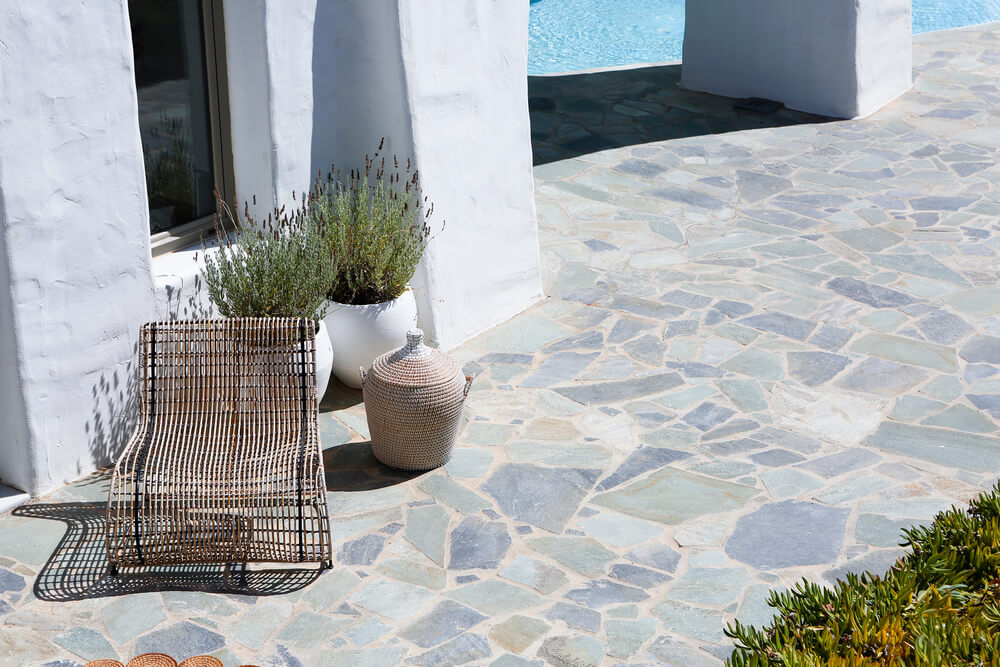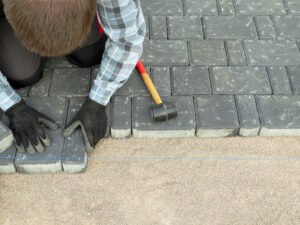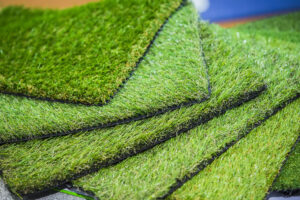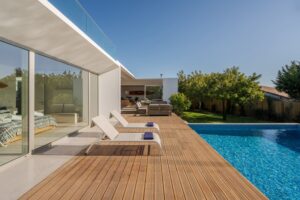Creating an inviting and functional outdoor space involves carefully considering various elements, and one crucial aspect is the choice of outdoor flooring.
The right choice can enhance the aesthetics of your outdoor area and provide durability and practicality for different activities. In this article, we will explore the pros and cons of five popular outdoor flooring materials: Poured Concrete, Concrete Pavers, Brick Pavers, Porcelain, and Ceramic.
By understanding the unique characteristics and considerations associated with different types of outdoor flooring, you’ll be better equipped to make an informed decision that suits your needs and preferences.
Whether you’re planning a patio, pool deck, or walkway, let’s delve into the details of these patio flooring options and discover their advantages and disadvantages.
Or, contact Cricket Pavers and let the pros give you a hand.
Poured Concrete
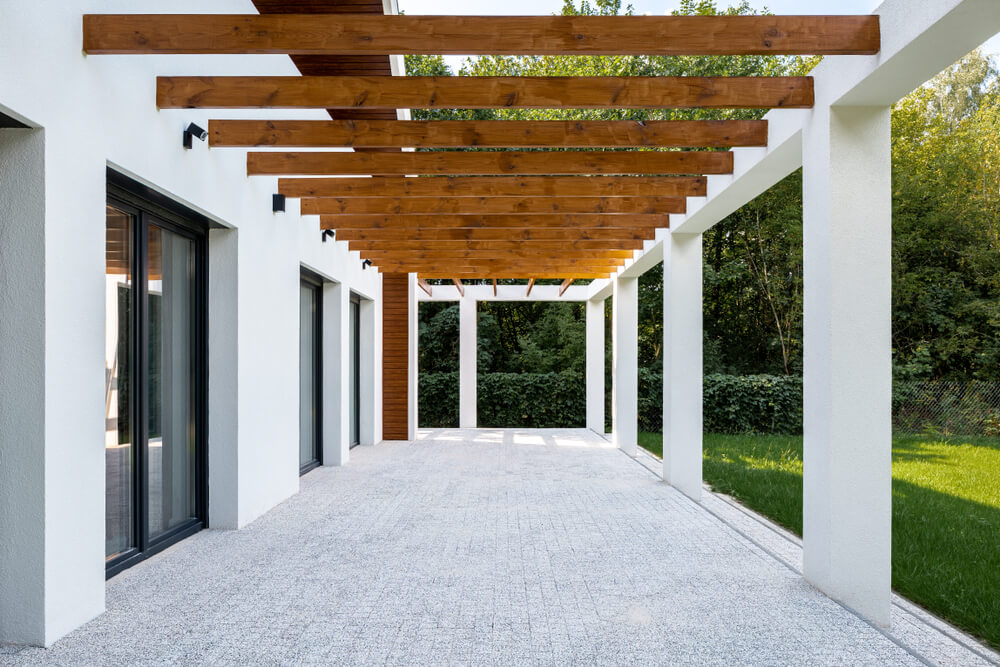
Poured concrete is a durable and versatile outdoor flooring choice that requires low maintenance. It involves pouring a concrete and water mixture onto a prepared surface, which hardens over time. Here are the pros and cons of using poured concrete for your outdoor space:
Pros:
- Durability and Longevity: Poured concrete can withstand heavy foot traffic, harsh weather conditions, and even vehicular use, providing a long-lasting and sturdy surface.
- Versatility in Design: The liquid nature of this material allows for various finishes, including smooth, stamped, or textured. You can also add color pigments to customize the look to your preferences.
- Low Maintenance: Compared to other deck flooring options, poured concrete is relatively low maintenance, requiring only regular cleaning and occasional sealing to keep it in good condition.
Cons:
- Susceptibility to Cracking: Poured concrete can develop cracks over time due to factors like shifting soil and temperature fluctuations, although proper installation techniques can help minimize this issue.
- Lack of Insulation: This option has limited insulation properties, meaning it can absorb and retain heat, potentially resulting in a hot surface under direct sunlight.
- Limited Aesthetic Appeal: While poured concrete offers design versatility, its industrial or utilitarian look may not suit every outdoor space.
Considering its durability, versatility, and low maintenance, it’s understandable why poured concrete is popular among patio flooring options.
However, it’s essential to be aware of its potential for cracking and lack of insulation properties.
By addressing these considerations, poured concrete can provide a solid and reliable foundation for your outdoor area.
Concrete Pavers
Concrete pavers are among the most versatile and visually appealing deck flooring options. These precast concrete blocks are available in various shapes, sizes, and colors. Let’s explore the pros and cons of using concrete pavers for your outdoor space:
Pros:
- Interlocking Design and Easy Installation: Concrete pavers feature an interlocking design that allows easy installation without needing mortar. They fit together tightly, creating a stable and durable surface. This makes them a great DIY option for homeowners.
- Wide Range of Colors, Shapes, and Sizes: Concrete pavers offer an extensive selection of colors, shapes, and sizes, allowing you to create unique patterns and designs. You can mix and match different pavers to achieve the desired aesthetic for your outdoor area.
- Flexibility in Repairs and Replacements: If a paver gets damaged or stained, it can be easily replaced without affecting the rest of the pavement. This makes maintenance and repairs more straightforward compared to other types of outdoor flooring.
Cons:
- Potential for Weeds and Shifting: The gaps between concrete pavers can become a breeding ground for weeds and require regular maintenance to prevent their growth. Additionally, over time, pavers may shift or become uneven due to soil movement, requiring occasional adjustments. You can avoid this issue with proper installment. That’s why hiring professionals should be your first choice.
- Higher Initial Cost Compared to Poured Concrete: Concrete pavers typically have a higher upfront cost compared to some of the other outdoor flooring materials. However, their long-term durability and ease of repair can offset this initial investment.
- Require Occasional Maintenance: While concrete pavers are relatively low maintenance, they may require occasional cleaning, resealing, and joint stabilization to ensure their longevity and appearance.
Concrete pavers offer a versatile and visually appealing option for outdoor flooring. Their interlocking design, wide range of choices, and ease of repairs make them attractive for homeowners. With proper maintenance, concrete pavers can provide a beautiful and functional outdoor surface.
Porcelain
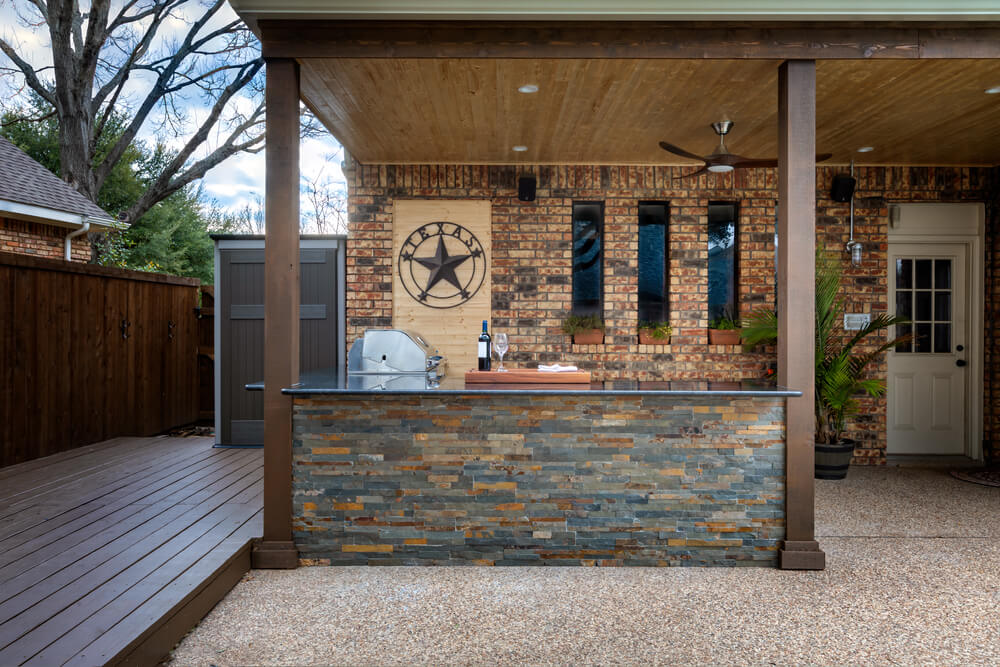
Made from a mixture of clay, sand, and other natural materials, porcelain tiles are fired at high temperatures, resulting in a dense, hard-wearing surface. Here are the key points to consider when evaluating porcelain as your outdoor solution:
Pros:
- High Durability and Resistance to Stains: Porcelain tiles are extremely durable and suitable for outdoor use. They are resistant to scratches, fading, and stains, making them ideal for areas that experience high foot traffic or exposure to the elements. Additionally, porcelain’s non-porous nature helps prevent the absorption of liquids and reduces the risk of staining.
- Wide Range of Colors, Textures, and Patterns: Porcelain tiles offer a vast array of colors, textures, and patterns to choose from, allowing you to create a customized look that matches your outdoor aesthetics. Whether you prefer a sleek and modern design or a rustic and natural appearance, porcelain tiles offer versatility in design options.
- Low Maintenance and Easy Cleaning: Porcelain requires minimal maintenance. Its smooth surface makes it easy to clean with regular sweeping or mopping. Also, its resistance to mold and mildew growth ensures a hygienic and hassle-free outdoor flooring solution.
Cons:
- Higher Cost Compared to Other Options: Porcelain tiles can be more expensive compared to some other outdoor flooring materials. However, the long-term durability and aesthetic appeal of porcelain often justify the initial investment.
- Professional Installation Recommended: While porcelain tiles are relatively straightforward to install, it is recommended to hire a professional for the best results. Proper installation techniques are crucial to ensure the tiles are laid evenly and securely, maximizing their longevity.
- Potential for Slipperiness When Wet: Like any hard surface, porcelain tiles can become slippery when wet. To avoid potential injuries, choosing tiles with textured surfaces or considering applying non-slip treatments to enhance traction, especially for areas prone to water exposure, is advisable.
Porcelain offers a durable, versatile, and visually appealing option for outdoor floors. Its resistance to stains, a wide range of design options, and low maintenance make it a popular choice among homeowners.
While porcelain may have a higher upfront cost and requires professional installation, its long-lasting performance and aesthetic appeal make it a worthwhile investment for outdoor spaces.
Find The Perfect Solution With Our Help
When choosing an outdoor flooring option for your space, it’s essential to consider your home’s specific needs and requirements. Poured concrete offers durability and versatility, while concrete pavers provide design flexibility. Porcelain, on the other hand, combines beauty and resilience in one material.
Contact Cricket Pavers to consult the pros and see which solution is perfect for your situation.
We have years of experience, and our team will gladly lend you a helping hand.
